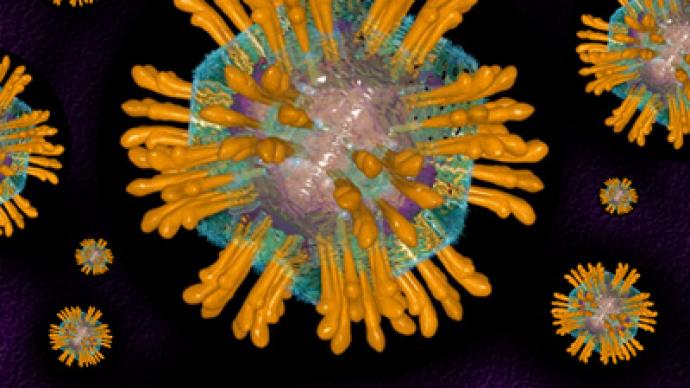Hepatitis C kills more in US than HIV

Studies show that deaths from hepatitis C (HCV) infection among US adults outnumber AIDS fatalities. And while greedy pharmaceutical giants advertise new drugs that cost a fortune, Oxford dons claim success in developing anti-HCV vaccine.
Hepatitis C virus, or HCV, causes serious liver infection which can eventually lead to fatal liver scarring (cirrhosis) and liver cancer. It passes with infected blood, and therefore, most people contract the disease in medical facilities through improperly sterilized medical instruments, blood transfusion, organ transplantation or while injecting drugs with shared needles.Up to 80 per cent of all cases end with chronic infection, when the virus persists for many years, quietly damaging the liver and rarely causing any noticeable symptoms.However, hepatitis C can turn deadly very quickly, especially when alcohol is involved on a regular basis. Another piece of bad news is that HCV is extremely difficult to get rid of, as well as it is the only type of hepatitis infection which cannot be prevented by vaccination.
Alarming trend
Up to 170 million people are estimated to be infected with HCV worldwide, says the World Health Organization. However, the fact that the virus lacks visible symptoms could mean that the real figure is much higher. In Egypt alone, staggering 22 per cent of the population is HCV-positive, making it the world’s worst-affected country.In the United States, HCV appears to be killing more people than HIV – the virus that causes AIDS. The shocking results were published on February 21 in Annals of Internal Medicine by the team led by Dr. John Ward of the US-based Centers for Disease Control and Prevention (CDC). Their data show that in 2007, hepatitis C killed 15,100 Americans, whereas about 12,700 deaths were registered as HIV-related.Another alarming conclusion is the trend. While HIV-related deaths have declined between 1999 and 2007, the recorded data for hepatitis C has shown a significant increase. Moreover, because these figures are based on death certificates, they almost certainly underestimate the real scope."The big issue is that most people with chronic infection are still not identified," Dr. Harvey Alter, a researcher with the National Institutes of Health told Reuters.
Why ‘baby boomers’
Approximately two thirds of all chronic HCV infections in the US are found in people born between 1945 and 1964, so-called “baby boomers”. Such predominance can be explained by the widespread injection-drug use between 1960s and 1980s, and a common practice to share needles.Other routes for the infection included blood transfusion and organ transplantation, before the universal screening was introduced in the United States in 1992. It is worth mentioning that many countries still do not screen blood donations for hepatitis C due to the cost.On the bright side, screening programs among risk groups, such as baby boomers in the US and Europe, could make big difference in fighting this disease, provided recent advances in treatment. CDC estimated that screening baby boomers would uncover extra 808,580 cases of hepatitis C in the US alone.
Treatment: Pay or die
Helpless before the virus as recently as 20 years ago, medicine announced tactical victory when a combination of two medications – interferon and ribavirin – was found to cure between 45 and 80 per cent of patients, depending on the viral genotype (with genotype 1 – the most common in Americas and Europe – being the most difficult to treat).In spring 2011, the US health authority, FDA, approved two new oral drugs that could send the cure rate in hard-to-treat genotype 1 patients from 45 to impressive 70 per cent, if combined with interferon and ribavirin. The life-saving medications are boceprevir (trade name Victrelis), developed by a pharmaceutical giant Schering-Plough, and telaprevir (Incivek) by Vertex and Johnson & Johnson.“Great!” you may think, “Then what are they waiting for?” Apart from their own citizens, the human-rights-concerned United States could now help the people of Egypt, to begin with, provided that health is one of those fundamental human rights democratic societies stand for. But in the real world, exporting NGOs to back anti-government protests, as well as tear gas canisters to suppress those protests, may prove to be easier than convincing pharmaceutical giants to sacrifice a small share of their colossal profits and make the price of life-saving drugs somewhat tolerable.With Incivek costing nearly US $50,000 for the course and Victrelis ranging between US $26,000 to US $48,000, depending on the duration of treatment, the future without hepatitis C may prove to be a more distant perspective – especially for those without access to first-class medical insurance.
Vaccine: All eyes on Oxford
Still, every cloud is supposed to have a silver lining, and every infection is better to prevent than to treat. Despite the fact that anti-HCV vaccine has not yet been developed, early clinical trials have yielded promising results, according to a team of Oxford University researchers.Forty-one uninfected patients were given the vaccine, which the scientists said created a strong immune response for a year or more without any significant side effects. In their recent publication in Science Translational Medicine, researchers say the next step will be to give at-risk members of the population the vaccine to see if it can prevent them from being infected with hepatitis C.Due to the fact that hepatitis C virus can only be contracted by humans, it was so far proving difficult to design a vaccine as animal trials are not an option.
Vitaliy Matveev, RT














